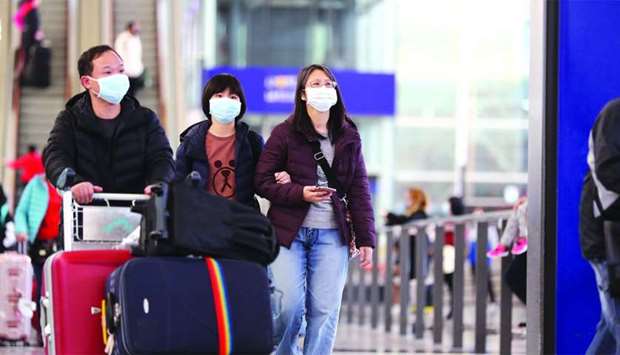Aviation Page - Beyond the Tarmac
Fears that China’s latest coronavirus outbreak could disrupt travel industry, aviation in particular, are widespread, even as airlines gear up following the threat of a new coronavirus originating from Wuhan, China.
No travel ban has been placed on travellers from or to China as yet, but authorities worldwide have raised an alert on the possible new coronavirus infection.
Many countries have reminded their airlines operating to and from China that a universal protective kit be made available anytime onboard, and also screen passengers, particularly from Wuhan.
If anybody is found ill, authorities concerned don’t let them board the plane. Travellers with additional symptoms such as fever, cough or difficulty breathing will have an additional health assessment.
Airlines have been advised to make in-flight announcements requesting passengers, in case they develop Severe Acute Respiratory Infection, with a history of fever and cough and history of travel to Wuhan City in last 14 days to self-declare at the port of arrival or to health authorities.
Passengers in most Southeast Asian countries are now being asked about their health and checked for symptoms. People who show symptoms will undergo a secondary screening to determine whether they might have some other respiratory infection — a strong possibility during cold and flu season — or need to be tested for the coronavirus.
Many airlines have directed their cabin crew to follow the operational procedures recommended by International Air Transport Association (IATA) with regard to managing the suspected communicable disease onboard an aircraft.
Travel is unusually heavy right now as people take trips to and from China to celebrate the Lunar New Year.
Nations across the Asia-Pacific region have stepped up checks of passengers at airports to detect the Sars-like coronavirus, which first emerged in the central Chinese city of Wuhan.
They have introduced screening measures to try to identify infected passengers and have stepped up screening of travellers arriving from China.
Thermal imaging scanners used at airports can potentially detect if a person has fever, experts say.
Fears of a bigger outbreak rose after a prominent expert from China's National Health Commission confirmed recently that the virus can be passed between people.
Authorities previously said there was no obvious evidence of person-to-person transmission and animals were suspected to be the source, as a seafood market where live animals were sold in Wuhan was identified as the centre of the outbreak.
Hundreds of millions of people are criss-crossing China this week in planes and in packed buses and trains to celebrate the Lunar New Year.
Reports citing China’s National Health Commission (NHC) say almost 80 new cases have been confirmed; bringing the total number of people hit by the virus in China to 291, with the vast majority in Hubei, the province where Wuhan lies.
Other cases have also been confirmed in Beijing and Shanghai plus Guangdong, Zhejiang and Henan provinces.
Most people with the infection are believed to have contracted it through exposure to animals at a market that sells seafood and meat in Wuhan.
Wuhan Tianhe international airport said that a temperature checkpoint would be installed at the entrance of its main terminal and all passengers would be checked. Those found to have fevers would be placed under quarantine.
Authorities in Hong Kong have also stepped up detection measures, including temperature checkpoints for inbound travellers.
Thailand has been monitoring incoming passengers at four airports receiving daily flights from Wuhan, including Bangkok, Phuket, Don Mueang and Chiang Mai, since January 3.
Two people have died in Thailand from the virus. One was detected at Bangkok airport by thermal surveillance equipment.
Many other countries too have introduced mandatory health screening of passengers from China.
Airport screenings are part of an effort to better detect and prevent the virus from the same family of bugs that caused an international outbreak of Sars and Mers that began in 2002 and 2012.
The World Health Organisation (WHO) stated that not enough is known about the novel coronavirus to draw definitive conclusions about how it is transmitted, clinical features of the disease, or the extent to which it has spread.
"The source also remains unknown," it said while urging all countries to be prepared to tackle the spread of the virus.
"WHO encourages all countries to continue preparedness activities on the novel coronavirus," the global health body had tweeted.
According to some medical professionals, Coronavirus is a large family of viruses that cause illness ranging from common cold to more severe ones lie the Middle East Respiratory Syndrome (Mers-CoV) and Severe Acute Respiratory Syndrome (Sars-CoV).
*Pratap John is Business Editor at Gulf Times.


